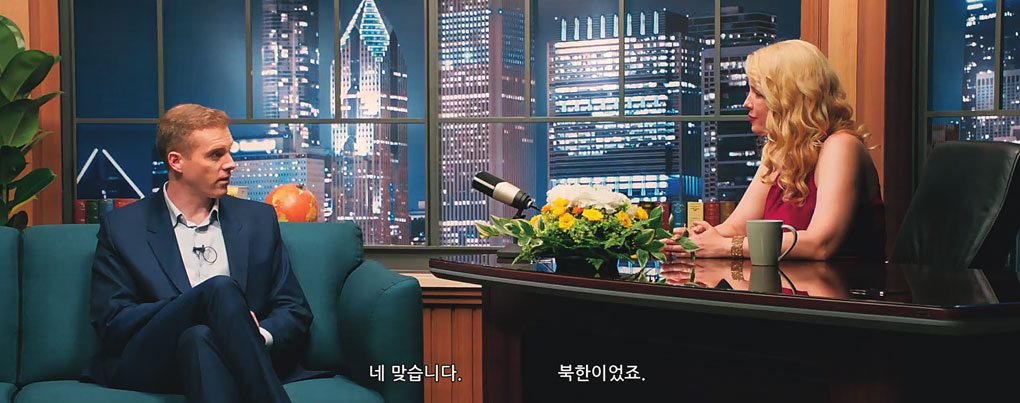A mistaken encounter with a Korean movie as a teenager eventually brought Pierce Conran to Korea, where the Irishman turned his passion into a profession. Today, he produces and critiques movies for fans of Korean cinema worldwide.

Pierce Conran is a movie aficionado who watches up to 800 films a year. He says his all-time favorite is Bong Joon-ho’s “Memories of Murder,” the movie that brought him to Korea.
Pierce Conran’s first look at Korean cinema was not teenage love at first sight. Lured by a catchy title and flashy cover while DVD shopping, he thought he would be watching a “fun and crazy” Japanese movie. Instead, he had “Sympathy for Mr. Vengeance,” the first film in director Park Chan-wook’s blood-soaked revenge trilogy.
“I found it violent and cruel. I just couldn’t connect with it at all,” Conran says. “In fact, I hated it so much that I told everyone about this Korean film I’d stumbled upon.” Yet, the movie gnawed at him. A few weeks later, he couldn’t help watching it again. “Suddenly I kind of fell in love with it,” Conran recalls. “When I watched the movie again, I could see there was purpose, there was intention. I couldn’t really fathom the director’s vision, but I suddenly realized that I needed to know more.” With piqued curiosity about Korea, he began to watch every Korean film he could get his hands on.
Conran was 16 at the time, already a film buff thanks to a childhood spent in Fribourg, Switzerland, known as the home of Gruyère cheese. His neighbors were mostly farmers and cow bells woke him in the morning. The pastoral setting, however, made for a rather lonely childhood, and movies became his companions. When he was 12, Conran was sent back to Ireland to attend a boarding school in Dublin, where he spent his free time at a nearby cinema complex. It was the late 1990s, when modern Asian cinema was beginning to gain attention abroad.
Scribe, Broadcaster & Producer
One sentence only begins to explain Conran’s work life in Korea. As he puts it: “Basically anything that touches on Korean cinema I’ve kind of managed to finagle my way into.” This year he was also on the jury at one of his favorite events, the Bucheon International Fantastic Film Festival, held in July.
Telling moviegoers worldwide about Korean cinema is Conran’s occupation. His main job is English editor of KoBiz, the website of the Korean Film Council (KOFIC). He writes features, news stories and columns for the site, and will soon be hosting a related YouTube channel. His other jobs include writing, producing and doing regular broadcasting slots on the English-language cable TV channel Arirang and TBS radio; reporting for ScreenAnarchy, a Canadian website mostly devoted to independent films; and participating in acquisitions for XYZ Films, an American film production and sales company based in Los Angeles. And producing movies is his secondary occupation.
Conran produces the “very independent” works of director Lee Sang-woo, whose features on the darker side of society come with titles such as “Mother is a Whore,” “Father is a Dog” and “I Am Trash.” Their latest production is a segment in the 2019 horror omnibus “Deathcember,” which features directors from around the world. The two first met at the 2012 edition of the Cinema Digital Seoul Film Festival (CinDi) and Lee suggested that they start working together.
By that time, Conran had begun to gain recognition in the Korean cinema world. In 2010, before graduating from Trinity College Dublin with an MA in French literature and film studies, he started a blog called “Korean Modern Cinema” and bounced between producing content for his website and writing his graduate thesis on Bong Joon-ho’s “Memories of Murder.” His efforts led to invitations to present papers at conferences and other international events. It was also a way for him to reach out online to other Korean film fans. One of them was Darcy Paquet, a film critic who is now a household name in Korea as the man who did the English subtitles for Bong Joon-ho’s Academy Award-winning “Parasite.”
When Paquet suggested that Conran come to Korea, he didn’t need to be convinced; the trip was already on his mind. Conran arrived in 2012 and began teaching English at a hagwon (private tutorial school). Just a few months later he landed the job editing the KoBiz English website. It all happened very quickly.

Though primarily a film critic, Pierce Conran’s involvement in the film world includes occasional acting roles. He appeared briefly as a journalist in Yeon Sang-ho’s “Peninsula,” a sequel to the 2016 zombie blockbuster “Train to Busan,” which opened in July 2020. © Next Entertainment World
Immersed Further
Conran attributes his quick transition mostly to luck, but his passion for film and his self-described “obsessive personality” laid the groundwork. In short, his enthusiasm opened up opportunities. “It has changed my life in all manner of ways, most notably personally,” he says.
“I’ve been very fortunate, there’s no doubt. I often worry that someday, someone’s going to pull the rug out from under my feet. But honestly, I think part of it is that you have a Western white man projecting positive views on Korean cinema. It puts me at an advantage and I’m well aware of that,” Conran says.
On the personal side, there is his marriage to director Lee Kyoung-mi. One newspaper article referred to him as “seongdeok,” meaning a “successful fan,” usually used in reference to K-pop fans who get to meet their idols. Laughing, Conran says, “I was a huge fan of ‘Crush and Blush,’ Kyoung-mi’s 2008 work, and was looking forward to her next movie.” They first met at a party when a director friend brought Lee over to him and shouted, “Hey everyone, this is Lee Kyoung-mi’s new boyfriend!” Despite the awkward beginning (He remembers people taking pictures as he stood there rubbing his arms and said, “Oh, hello.”), he says everything transpired very naturally and they were married in 2018.
Adding to his other work, Conran supports his wife in various ways when she makes movies. For Lee’s segment in “Persona,” an anthology of four shorts produced by Netflix, he appeared on screen as the aspiring boyfriend of a girl played by K-pop star IU (Lee Ji-eun). She tells him that she’ll agree to a date if he first seduces her father’s new lover (Bae Doona), whom she despises. He tries and fails. Though by no means a would-be actor, Conran says, “I just love being on movie sets. It’s always a thrill for me to be involved at that level.” He also appears in Yeon Sang-ho’s “Peninsula,” this year’s summer sequel to the 2016 hit zombie thriller “Train to Busan.”
“Korean cinema is so great because it effectively tries to expunge all the bad things, the tribulations of generations through 20th century history and modern social ills.”
Into the Future
Conran has watched attitudes toward Korean cinema change over the years, and then came “Parasite.” There has always been a certain degree of international respect for the quality, unique stories and high production values of Korean films, he notes. But if the rave was a little forced before, it is now real. “The sky’s the limit,” he says. “I think the whole world is moving toward genre cinema. And that gives Korea an edge.” Moreover, with the increasing shift toward streaming services and the further push in that direction by social distancing due to the COVID-19 pandemic, he believes the Korean entertainment industry has an advantage, having proved itself with TV serials.
If anything worries him about Korean cinema, it’s the limited range of references: “These days when it comes to plot and music, all I see and hear are references to Bong Joon-ho and Park Chan-wook, Christopher Nolan … Fifteen years ago there were a lot of flops and experimentation, but that was very exciting. Now, films are very polished but a lot of them are really similar.” His own tastes are wide-ranging, gravitating toward more obscure works as well as genre cinema and films with a strong message. “Memories of Murder” is his all-time favorite. He calls it the “perfect film” that really hooked him into coming to Korea.
What he loves most about Korean movies is actually linked to his dislikes about his adopted home. “When I first arrived, everything was giddy excitement and I loved everything. Then it suddenly became my life and I came to hate many aspects,” he says, mentioning business practices, patriarchy and various social problems. “Korean cinema is so great because it effectively tries to expunge all the bad things, the tribulations of generations through 20th century history and modern social ills. It all comes out in cinema and that’s what makes it so great.”
Conran’s feelings for Korea have in this way evolved over the years. “Getting married and welcomed into the family have deepened my understanding and love of the country. It also helps that my Korean is improving, though slowly,” he says. In the future he hopes to do more production work, for which he realizes that he will need to speak the language well.
A consummate cinephile and avid Blu-ray collector, Conran seems truly lucky to be doing the thing that he loves. “I watch a lot of movies. But I watch far too many, like 800 per year,” he says, as if a bit surprised at the number himself. Then, with a smile, he adds, “That’s my thing.”
Cho Yoon-jungFreelance Writer and Translator
Heo Dong-wukPhotographer